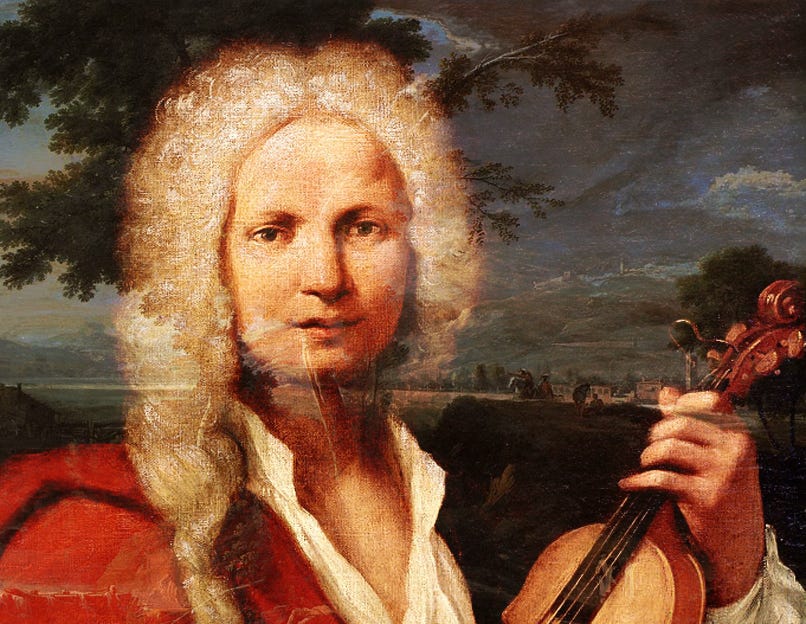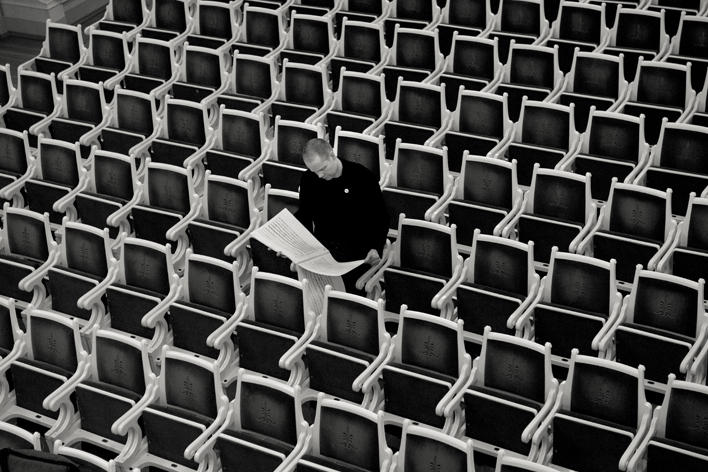| Recomposed by Max Richter: Vivaldi – The Four Seasons | ||||
|---|---|---|---|---|
| Studio album by | ||||
| Released | August 31, 2012 | |||
| Recorded | March 12–13, 2012 | |||
| Studio | B-Sharp, Berlin, Germany | |||
| Genre |
| |||
| Length | 43:58 | |||
| Label | ||||
| Producer | Max Richter | |||
| Max Richter chronology | ||||
| ||||
| Alternative cover | ||||
2014 Deutsche Grammophon cover | ||||
| Alternative cover | ||||
Vivaldi's Four Seasons was my serious introduction to Classical Music. At the time, I did not know that it was Baroque and that there would be a difference in my taste and choice. Since then, my choice of music has been the Baroque Era music. The instruments, the pomp and charm keep me riveted. Vivaldi's fall dance is boisterous and capricious, and oine wonders how the young girls in the composer's Ospitale fared in this tricky work. Under his benevolent tutilage, they likely turned in memorable performances. I have bought random Four Seasons over the past 30 years as it was a childhood favorite, and I have been often disappointed. We would like to thank you for visiting our website! Please find below all The Four Seasons composer crossword clue answers and solutions for The Guardian Post Daily Crossword Puzzle. Since you have landed on our site then most probably you are looking for the solution of The Four Seasons composer. Composer Gallery. Teacher Resources. The Four Seasons. The Four Seasons is by far Vivaldi's most famous piece. Each season has a concerto that describes it in the music. A concerto is a piece of music that is like a conversation between the orchestra and a solo instrument or a small solo group. Vivaldi LOVED writing concertos. Vivaldi's The Four Seasons are four violin concertos composed in Venice, Italy, at the height of the Baroque era in 1720. They were striking for the time: modern, virtuosic and energetic, they used music to evoke a scene and tell a story.

Recomposed by Max Richter: Vivaldi – The Four Seasons is a composition that features on a 2012 album by neo-classical composer Max Richter, released on August 31, 2012 on Universal Classics and Jazz (Germany), a division of Universal Music Group, and Deutsche Grammophon,[1] and further recorded by Fenella Humphreys and released on Rubicon Classics in 2019.[2] The piece is a complete recomposition and reinterpretation of Vivaldi's The Four Seasons.
Although Richter said that he had discarded 75 percent of Vivaldi's original material,[3] the parts he does use are phased and looped, emphasising his grounding in postmodern and minimalist music.[4]
The Deutsche Grammophon album was played by the violinist Daniel Hope and the Konzerthaus Kammerorchester Berlinsymphony orchestra, and conducted by André de Ridder. On the album, Hope plays the 'Ex-Lipinski' violin, an instrument made by Giuseppe Guarneri del Gesù in 1742 and made available to the violinist by a German family who asked to remain anonymous.
The Rubicon Classics recording features soloist Fenella Humphreys and the Covent Garden Sinfonia, conducted by Ben Palmer. Humphreys recorded using a violin from the circle of Peter Guarneri of Venice, made in 1727.
Release[edit]
Richter’s recomposed version of Vivaldi's The Four Seasons was premiered in the UK at the Barbican Centre on 31 October 2012, performed by the Britten Sinfonia, conducted by André de Ridder, with violinist Daniel Hope the soloist.[5] The album topped the iTunes classical chart in the UK, Germany, and the US.[6] The US launch concert in New York at Le Poisson Rouge was recorded by NPR and streamed live.
Critical reception[edit]
Recomposed by Max Richter: Vivaldi – The Four Seasons received widespread acclaim from contemporary classical music critics.
Ivan Hewett of the Telegraph gave the album a very positive review, stating:
As you would expect of a composer who once studied with the great modernist Luciano Berio, Richter is very self-aware. He notices that his own taste in repeating patterns doesn’t mesh with the apparently similar patterns in Vivaldi. They obey a different logic, and the friction between them generates a fascinatingly ambiguous colour. Richter teases out and heightens this colour, sometimes with Vivaldi uppermost, sometimes himself. It is a subtle and often moving piece of work, which suggests that after years of tedious disco and trance versions of Mozart, the field of the classical remix has finally become interesting.[7]
Track listing[edit]
All tracks are written by Max Richter.
| No. | Title | Length |
|---|---|---|
| 1. | 'Spring 0' | 0:42 |
| 2. | 'Spring 1' | 2:31 |
| 3. | 'Spring 2' | 3:19 |
| 4. | 'Spring 3' | 3:09 |
| 5. | 'Summer 1' | 4:11 |
| 6. | 'Summer 2' | 3:59 |
| 7. | 'Summer 3' | 5:01 |
| 8. | 'Autumn 1' | 5:42 |
| 9. | 'Autumn 2' | 3:08 |
| 10. | 'Autumn 3' | 1:45 |
| 11. | 'Winter 1' | 3:01 |
| 12. | 'Winter 2' | 2:51 |
| 13. | 'Winter 3' | 4:39 |
| Total length: | 43:58 | |
| No. | Title | Length |
|---|---|---|
| 14. | 'Shadow 1' | 3:53 |
| 15. | 'Shadow 2' | 2:30 |
| 16. | 'Shadow 3' | 3:33 |
| 17. | 'Shadow 4' | 2:33 |
| 18. | 'Shadow 5' | 3:01 |
| Total length: | 59:28 | |

| No. | Title | Length |
|---|---|---|
| 19. | 'Spring 1' (Max Richter Remix) | 4:58 |
| 20. | 'Summer 3' (Robot Koch Remix) | 3:28 |
| 21. | 'Autumn 3' (Fear of Tigers Remix – Radio Edit) | 4:06 |
| 22. | 'Winter 3' (NYPC Remix) | 4:59 |
| Total length: | 76:59 | |

Personnel[edit]
Main personnel
- Max Richter – composer, mixing, producer, quotation author
- André de Ridder – conductor
- Daniel Hope – primary artist, violin [solo]
- Raphael Alpermann – harpsichord
- Konzerthaus Kammerorchester Berlin – orchestra
- Alexander Kahl – cello
- David Drost – cello
- Nerina Mancini – cello
- Ying Guo – cello
- Ernst-Martin Schmidt – viola
- Felix Korinth – viola
- Katja Plagens – viola
- Matthias Benker – viola
- Alicia Lagger – violin [first]
- Christoph Kulicke – violin [first]
- Karoline Bestehorn – violin [first]
- Sayako Kusaka – violin [first], concertmaster
- Cornelia Dill – violin [second]
- Jana Krämer – violin [second]
- Johannes Jahnel – violin [second]
- Ulrike Töppen – violin [second]
- Ronith Mues – harp
- Georg Schwärsky – double bass
- Jorge Villar Paredes – double bass
- Sandor Tar – double bass
Additional personnel
The Four Seasons Composers
- Antonio Vivaldi – original material
- Felix Feustel – product manager
- Neil Hutchinson – recording engineer, mixing
- Christian Kellersmann – original concept
- Nick Kimberley – liner notes
- Götz-Michael Rieth – mastering engineer
- Mandy Parnell – mastering engineer
- Matthias Schneider – project manager
- Erik Weiss – photography
- Jenni Whiteside – editing
- Double Standards – art direction
Charts[edit]
The Four Seasons Composer

Vivaldi Four Seasons
| Chart (2018) | Peak position |
|---|---|
| New Zealand Heatseeker Albums (RMNZ)[8] | 5 |

References[edit]
- ^Recomposed by Max Richter – Antonio Vivaldi – Die vier Jahreszeiten – The Four Seasons: Deutsche Grammophon Catalog
- ^'Rubicon Classics'. rubiconclassics.com. Retrieved 2019-06-12.
- ^'Recomposed by Max Richter: Vivaldi, The Four Seasons'. Retrieved 27 December 2012.CS1 maint: discouraged parameter (link)
- ^Tania Halban (28 November 2012). 'Recomposed or refragmented?'. Retrieved 1 February 2013.CS1 maint: discouraged parameter (link)
- ^'Max Richter: Vivaldi Recomposed'. 31 October 2012. Archived from the original on 9 November 2012. Retrieved 10 December 2012.CS1 maint: discouraged parameter (link)
- ^'RECOMPOSED | Chart-Erfolg für Max Richters 'Vivaldi Recomposed' in den USA | News'. Klassikakzente.de. Retrieved 29 November 2013.CS1 maint: discouraged parameter (link)
- ^Hewett, Ivan (2012-10-31). 'Vivaldi remixed: classical music reinvents itself'. The Telegraph. ISSN0307-1235. Retrieved 2017-11-21.
- ^'NZ Heatseeker Albums Chart'. Recorded Music NZ. March 26, 2018. Retrieved March 23, 2018.CS1 maint: discouraged parameter (link)
